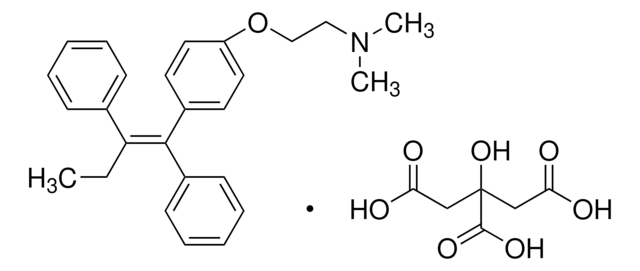Wichtige Dokumente
H7904
(Z)-4-Hydroxytamoxifen
≥98% (HPLC), powder, estrogen receptor modulator
Synonym(e):
4OH-Tamoxifen, (Z)-4-(1-[4-(Dimethylaminoethoxy)phenyl]-2-phenyl-1-butenyl)phenol, (Z)-4-OHT, trans-4-Hydroxytamoxifen
About This Item
Empfohlene Produkte
product name
(Z)-4-Hydroxytamoxifen, ≥98% Z isomer
Qualitätsniveau
Assay
≥98% (HPLC)
Form
powder
Lagerbedingungen
desiccated
protect from light
Löslichkeit
methanol: 10 mg/mL
ethanol: 20 mg/mL (with heating)
Wirkungsspektrum von Antibiotika
neoplastics
Wirkungsweise
enzyme | inhibits
Ersteller
AstraZeneca
Lagertemp.
2-8°C
SMILES String
CC\C(c1ccccc1)=C(/c2ccc(O)cc2)c3ccc(OCCN(C)C)cc3
InChI
1S/C26H29NO2/c1-4-25(20-8-6-5-7-9-20)26(21-10-14-23(28)15-11-21)22-12-16-24(17-13-22)29-19-18-27(2)3/h5-17,28H,4,18-19H2,1-3H3/b26-25-
InChIKey
TXUZVZSFRXZGTL-QPLCGJKRSA-N
Angaben zum Gen
human ... ESR1(2099) , ESR2(2100) , ESRRG(2104) , IL6(3569)
rat ... Ar(24208) , Esr1(24890) , Esr2(25149)
Allgemeine Beschreibung
Anwendung
- Als Medienzusatz zur Untersuchung der Zellviabilität durch den WST-1-Test
- Zur Einleitung der Deletion des Wachstumshormongens TGF-β in Mäusen
- Zur Einleitung der Cre-Rekombinase-Aktivität in vitro.
Leistungsmerkmale und Vorteile
Signalwort
Danger
H-Sätze
Gefahreneinstufungen
Acute Tox. 4 Oral - Aquatic Acute 1 - Aquatic Chronic 1 - Carc. 1B - Repr. 1B
Lagerklassenschlüssel
6.1C - Combustible acute toxic Cat.3 / toxic compounds or compounds which causing chronic effects
WGK
WGK 3
Flammpunkt (°F)
Not applicable
Flammpunkt (°C)
Not applicable
Persönliche Schutzausrüstung
Eyeshields, Gloves, type P3 (EN 143) respirator cartridges
Analysenzertifikate (COA)
Suchen Sie nach Analysenzertifikate (COA), indem Sie die Lot-/Chargennummer des Produkts eingeben. Lot- und Chargennummern sind auf dem Produktetikett hinter den Wörtern ‘Lot’ oder ‘Batch’ (Lot oder Charge) zu finden.
Besitzen Sie dieses Produkt bereits?
In der Dokumentenbibliothek finden Sie die Dokumentation zu den Produkten, die Sie kürzlich erworben haben.
Kunden haben sich ebenfalls angesehen
Artikel
The CRISPR-Cas9 system is an RNA-guided genome-editing tool that provides researchers a simple, easy, and quick way to modify the genomes of various organisms.
Unser Team von Wissenschaftlern verfügt über Erfahrung in allen Forschungsbereichen einschließlich Life Science, Materialwissenschaften, chemischer Synthese, Chromatographie, Analytik und vielen mehr..
Setzen Sie sich mit dem technischen Dienst in Verbindung.








